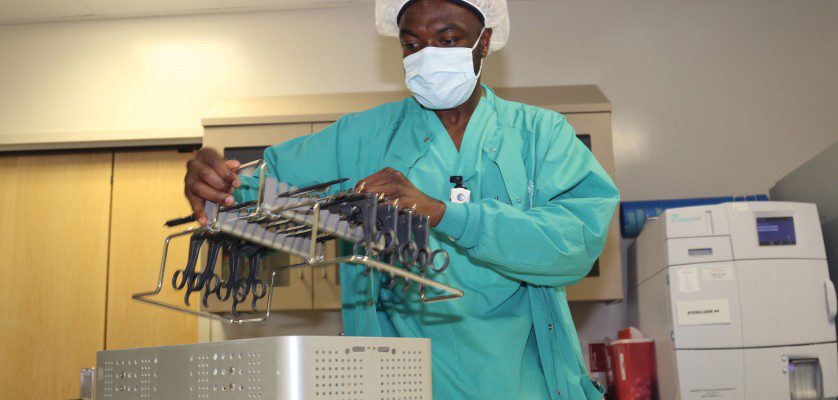FORT IRWIN, Calif. — When Sgt. Jonathan Kwaning left Ghana headed for the United States in 2014, he dreamed of becoming a nurse.
Kwaning, now an operating room noncommissioned officer with Weed Army Community Hospital, faced many challenges, but overcame them all to get one step closer to his dream by earning acceptance into the Army Medical Department (AMEDD) Enlisted Commissioning Program.
The AEC Program is a two-year program that gives Soldiers the opportunity to attend nursing school and earn a Bachelor of Science in Nursing. Upon passing the National Council Licensure Examination, Soldiers then become commissioned officers in the Army Nurse Corps.
For Kwaning, his acceptance into the program is the product of years of resilience and hard work.
After relocating to the U.S., Kwaning worked at a department store in New York and eventually worked his way up from the women’s shoe department to a leader in the shipping department.
When he was not working, Kwaning prepared for nursing school.
“Immediately after I got into this country, I started taking prerequisites for nursing, knowing that one day I wanted to pursue that dream,” he said.
On his way to take a test to gain entrance into a college nursing program, Kwaning said he passed by a recruiting office and decided to see what they could offer him.
The recruiter told Kwaning he could pursue his dream of becoming a nurse and let the Army pay for it.
“I joined the Army to serve, but also to follow the dreams that I’ve been trying to get all this time to purse a nursing career,” he said.
After realizing he could not join in the military as a licensed practical nurse due to citizenship requirements, Kwaning said he felt disappointed, but did not give up.
He accepted his current job and decided as long as he was in the medical field, he could still make his dreams a reality.
Kwaning attended basic combat training in early 2019 and during advanced individual training, he learned about AEC Program from a fellow Soldier.
In the second phase of AIT at Tripler Army Medical Center in Honolulu, Hawaii, he first met his current noncommissioned officer in charge, Sgt. 1st Class Pretoria Richardson.
Richardson, the Weed ACH operating room NCOIC, said she wrote one of Kwaning’s reference letters for the AEC Program because of his drive and work ethic.
“He’s always done stuff to set himself apart from his peers,” she said. “Before he even became an NCO, he was already acting in an NCO role.”
Following AIT, Kwaning began working at Weed ACH in November 2019, where he started gathering the documents necessary for the AEC Program, but more obstacles arose.
“I needed a release memorandum from branch, but couldn’t get it because the program requires 24 months in service, so I had to stop last year and begin this year,” Kwaning said.
While he waited to meet the time in service requirement for the AEC Program, Kwaning earned his United States citizenship.
Shortly after earning citizenship, he entered his second year of military service and began working with a medical recruiter to once again pursue the AEC Program.
At the end of September, Kwaning received a phone call while setting up a back table for surgery.
Kwaning said he usually does not answer his phone while performing that aspect of his job, but he had a feeling.
He asked another Soldier to grab his phone for him and saw it was the medical recruiter calling.
Through the speakerphone, Kwaning received the news that he had been accepted into the AEC Program.
“I was happy,” he said. “I couldn’t jump and stuff because I was sterile and I didn’t want to contaminate my back table.”
Richardson said she knew Kwaning would get into the program.
“I didn’t think he was going to have any problems getting into the AEC Program at all,” she said. “His [grade point average is] high, his recommendations were good, and he’s overall a good Soldier.”
Still, Kwaning said he knew getting in was not as easy as it may have looked.
“The program is very competitive,” he said. “I saw they only picked 29 [people] out of the whole Army, so it’s something that if you get into, you should be proud.”
Even though the program is competitive, Richardson said she recommends applying.
“I know a lot of people feel like they can get more school completed getting out of the military first then coming back in,” she said. “But if they can get into the AEC Program, have the Army pay for it, and still have active duty time, I would recommend it, especially if they’re going to make it a long term career.”
Kwaning is slated to start the AEC Program next fall and said he is grateful he never gave up on his dream.
“I felt like everything I’ve been put through this time didn’t go to waste,” he said. “It’s worth it.”












